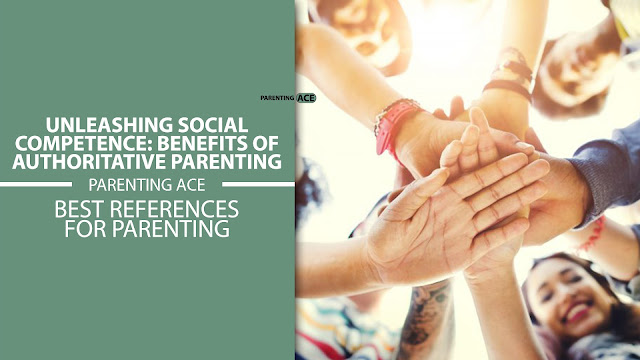Unlocking the Power of Social Competence: The Benefits of Authoritative Parenting
In the intricate dance of child development, social competence emerges as a pivotal skill, guiding individuals through the labyrinth of social interactions and relationships. At the heart of this journey lies authoritative parenting, a nurturing approach that intertwines warmth, guidance, and clear boundaries. In this blog post, we embark on a voyage into the symbiotic relationship between authoritative parenting and social competence, unraveling the threads that weave together resilient, empathetic, and socially adept individuals. Join us as we explore how the principles of authoritative parenting lay the groundwork for lifelong success in the dynamic tapestry of human connection.
 |
| Unleashing Social Competence: Benefits of Authoritative Parenting |
In the intricate web of child development, social competence stands as a cornerstone for success. It encompasses the ability to navigate social situations effectively, form meaningful relationships, and communicate assertively. One parenting style that consistently emerges as a catalyst for fostering social competence is authoritative parenting. In this article, we delve into the profound impact of authoritative parenting on social competence and its enduring benefits.
Understanding Social Competence
Social competence is not merely the ability to make friends or engage in polite conversation. It represents a complex set of skills that enable individuals to interact harmoniously within their social environment. These skills include emotional regulation, empathy, effective communication, conflict resolution, and the capacity to adapt to various social contexts. Children who possess high levels of social competence tend to experience greater academic success, healthier relationships, and overall well-being throughout their lives.
The Essence of Authoritative Parenting
Authoritative parenting is characterized by warmth, responsiveness, and clear expectations. Unlike authoritarian parenting, which relies on strict control and punishment, authoritative parents maintain a balance between nurturing and setting limits. They provide guidance and support while allowing children the freedom to express themselves and learn from their experiences. This parenting style fosters open communication, mutual respect, and collaboration between parents and children.
The Nexus between Authoritative Parenting and Social Competence
The relationship between authoritative parenting and social competence is profound and multifaceted. By cultivating an environment of trust and autonomy, authoritative parents equip children with essential social skills:
- Emotional Regulation: Authoritative parents validate their children's emotions and teach them healthy ways to express and manage feelings. This foundation of emotional intelligence enables children to regulate their emotions effectively in social interactions.
- Empathy and Perspective-Taking: Through empathetic responses and perspective-taking exercises, authoritative parents instill empathy in their children. Empathetic children are better equipped to understand others' feelings and perspectives, leading to more compassionate and harmonious relationships.
- Effective Communication: Authoritative parents prioritize open and honest communication, encouraging children to express their thoughts and feelings freely. This fosters strong communication skills, enabling children to articulate their needs, resolve conflicts constructively, and advocate for themselves assertively.
- Independence and Responsibility: By granting age-appropriate autonomy and holding children accountable for their actions, authoritative parents nurture independence and responsibility. Children learn to make thoughtful decisions, consider the consequences of their choices, and take ownership of their behavior in social settings.
- Social Problem-Solving: Authoritative parents guide children through social challenges, offering guidance and support without rescuing them from every difficulty. This empowers children to develop effective problem-solving skills, resilience, and confidence in navigating social situations autonomously.
The Enduring Benefits
The benefits of authoritative parenting extend far beyond childhood, shaping individuals' social competence and well-being into adulthood. Research consistently highlights the long-term advantages of authoritative parenting, including:
- Stronger Interpersonal Relationships: Adults who were raised in authoritative households tend to have healthier, more satisfying relationships characterized by trust, communication, and mutual respect.
- Higher Academic Achievement: Socially competent individuals are better equipped to collaborate with peers, communicate effectively with teachers, and navigate academic challenges, resulting in higher academic performance and lifelong learning.
- Emotional Resilience: Socially competent adults are more resilient in the face of adversity, possessing the skills to seek support, cope with stress, and maintain psychological well-being during challenging times.
- Professional Success: The interpersonal skills nurtured through authoritative parenting, such as teamwork, leadership, and conflict resolution, are highly valued in the workplace. As a result, individuals raised with authoritative parenting principles often excel in their careers and leadership roles.
Social competence is a vital asset that empowers individuals to thrive in diverse social landscapes. Authoritative parenting serves as a cornerstone for nurturing social competence, laying the foundation for children to navigate the complexities of human interaction with confidence and grace. By embracing the principles of warmth, responsiveness, and clear expectations, parents can unlock the transformative power of authoritative parenting, fostering a generation of socially competent, resilient, and thriving individuals.




